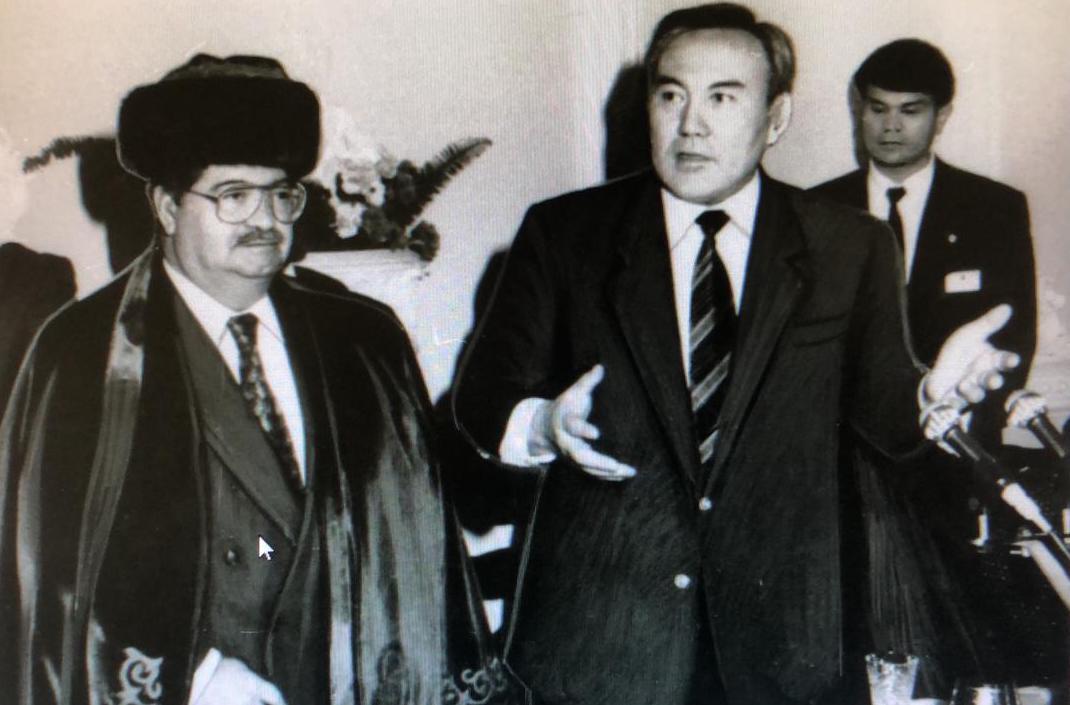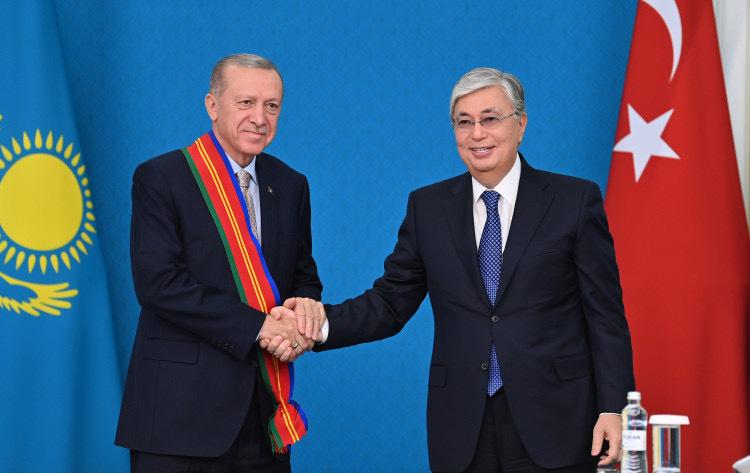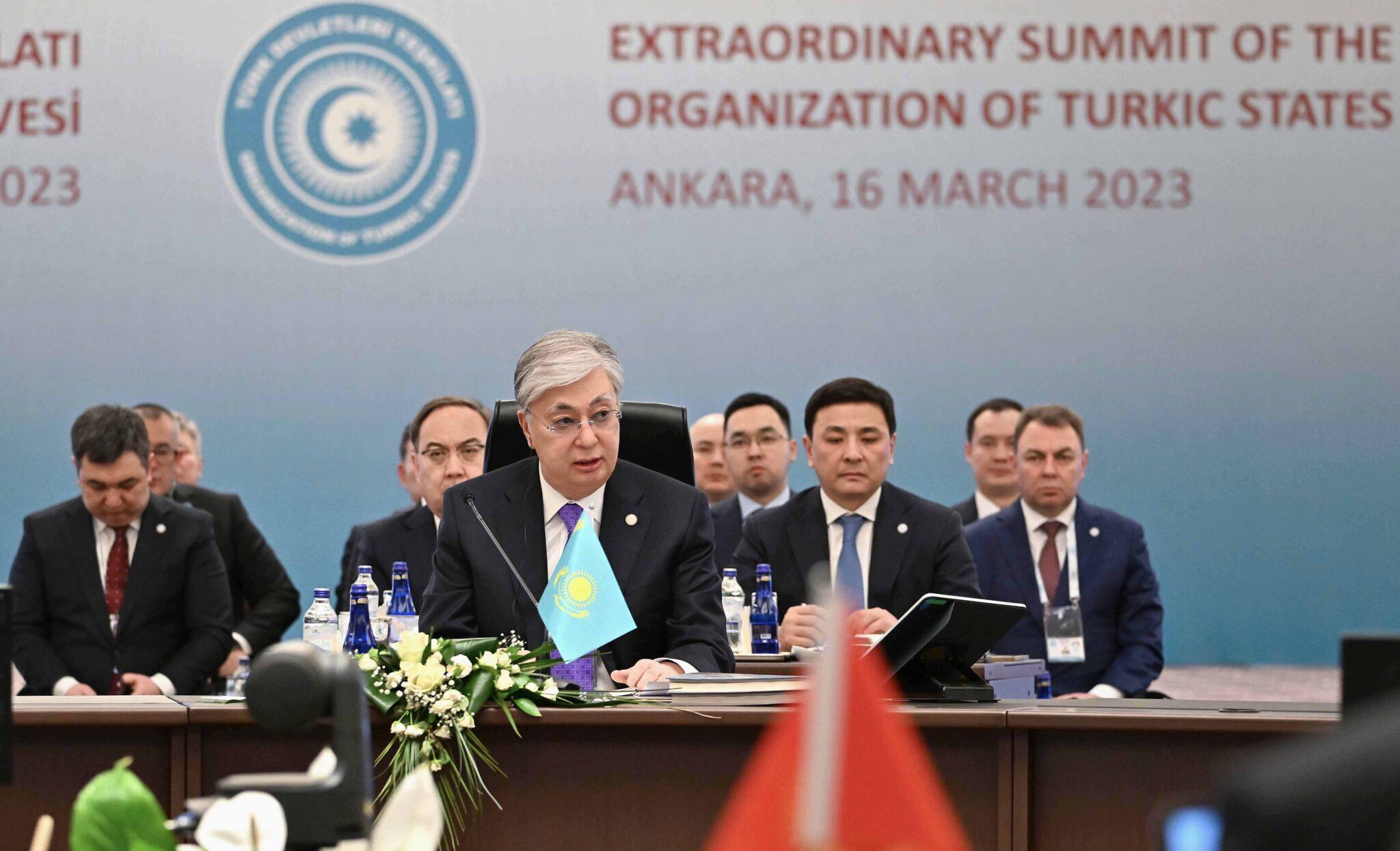Pan-Turkism: Turkic vector in Kazakhstan’s foreign policy
Kazakhstan emerged as a key player in Turkic reintegration following the dissolution of the Soviet Union in 1991, when the ideology advocating for the unity of Turkic-speaking peoples began to gain traction. Since then, the Turkic vector in Kazakhstan’s foreign policy has served as the basis for strengthening national identity, ensuring regional stability, and balancing external influence, The Astana Times wrote in an article published on February 21. Caliber.Az reprints the article.
The country’s decisive role in Turkic unification precipitated the establishment of interparliamentary and intergovernmental structures, platforms for educational, scientific, and cultural exchange, as well as the creation of investment initiatives and business partnerships.
Global impact of centuries-old Turkic interaction
The key venue for Turkic cooperation is the Organization of Turkic States (OTS) founded in 2009. Prior to its renaming in Istanbul three years ago, the intergovernmental platform was known as the Cooperation Council of Turkic Speaking States or, in short, the Turkic Council. The organization includes five members (Azerbaijan, Kazakhstan, the Kyrgyz Republic, Türkiye, and Uzbekistan). Overall, the territory of the OTS member states, brimming with vast economic opportunities, is home to 260 million people.

A blueprint for Turkic reintegration was the Nakhchivan Agreement signed by Azerbaijan, Kazakhstan, the Kyrgyz Republic, and Türkiye on Oct. 3, 2009. Uzbekistan, in turn, joined the Turkic alliance in 2018 with the coming to power of Uzbek President Shavkat Mirziyoyev in 2016 and hence a rapid development of Turkish-Uzbek relations.
The genuine Turkic history traces its roots to ancient times and historians still debate about its inception. Some claim that Turkic-speaking peoples emerged as distinct ethnic groups back in the sixth century of the common era (CE). The first known reference to Turks was found in the Inscription of Hüis Tolgoi, an 11-line text in Brahmi script, which dates back to that time. This period also coincides with the establishment of the First Turkic Khaganate in Central Asia, also known as Gokturk Khaganate. It is historically known as the first Central Asian transcontinental empire.
First hunter-gatherers and farmers, Turks later became nomadic pastoralists. Notably, they have always played an integral role in bridging East and West. A striking example is the Great Silk Road, which paved the first transnational caravan routes through the Eurasian continent from the Mediterranean Sea to China. Until the mid-15th century, the road went east to the territory of present-day Korea and Japan, west to what is now Russia, Eastern and Western Europe, and south to modern India and the Middle East.
United by common problems in the late 19th and early 20th centuries, Turkic-speaking peoples in Central Asia, the Caucasus, and Eastern Europe initiated a pan-Turkic political movement in response to the decline of the Ottoman Empire and the growing influence of European nationalist movements.
The revival of pan-Turkism in Kazakhstan’s initiatives
After the Soviet Union collapsed, Türkiye was the first country to recognize the independence of all Central Asian states and provide aid for the initial development of the region. Kazakhstan was the primary focus for Türkiye given its largest territory in the region, vast resources, and transit potential.
The idea of creating the Turkic Council historically belongs to Astana. It was put forward by Kazakhstan in 2006, as well as the initiative to form the Interparliamentary Assembly of Turkic Countries (TurkPA).

Prior to that, in the early 1990s, Kazakhstan was among the initiators behind the establishment of the International Organization of Turkic Culture, known as TURKSOY or the United Nations Educational, Scientific and Cultural Organization (UNESCO) of the Turkic World. Its fundamental role in historical and cultural exchange lays the basis for strengthening trust between the nations.
As for science and education, Kazakhstan initiated the creation of the Turkic Academy in 2012, perhaps to expedite the building of national identity and restoring details of Turkic history, which were erased from the minds of Kazakhs during the Soviet regime.
The country’s latest proposal was the creation of the Turkic Investment Fund (TIF) to mobilize the economic potential of member countries and attract investments. OTS member states assigned the Kazakh capital the status of a financial center of the Turkic world. Investments represent the main factor of Kazakhstan’s economic growth. The Kazakh government puts all its efforts to provide investors with an effective regulatory environment aiming to attract at least $150 billion of foreign investment by 2029.
Last year marked the 10th-anniversary summit of the OTS. The November meeting in the Kazakh capital reaffirmed the collective responsibility of the heads of Turkic states in addressing global challenges. The jubilee event took place ahead of Kazakhstan’s chairmanship in the OTS for 2024, which will be based on eight pillars – traditions, unification, reforms, knowledge, trust, investment, mediation, and energy (TURKTIME), introduced by Kazakh President Kassym-Jomart Tokayev.
The Turkic leaders signed 12 agreements, including a roadmap for the 2023-2027 transport communication program, regulations for permanent representatives, the introduction of new flags for Turkic organizations, and the decision to grant the Economic Cooperation Organization (ECO) an observer status within the OTS.
Türkiye’s soft power in cooperation with Kazakhstan
Kazakhstan and Türkiye have maintained close cooperation from the very beginning. In March 1991, the first official visit by a foreign head of state to sovereign Kazakhstan was paid by then-Turkish President Turgut Özal. The Turkish diplomatic mission, which was opened a year later in Almaty, became the first foreign mission in the country. In the same year, Kazakhstan opened its first embassy abroad in Ankara.

For Kazakhstan and Türkiye, culture and education take center stage in expanding people-to-people contacts and preserving common interests. The first step in this direction was the signing of an agreement on cultural cooperation between the State Committee of the Kazakh SSR and the Turkish Ministry of Culture back in 1990. Since then, the sides have developed a raft of projects. For example, Khoja Akhmet Yassawi International Kazakh-Turkish University in Turkistan and the Almaty-based Suleyman Demirel University (SDU) enjoy high demand among Kazakh population, as well as the network of more than 40 Kazakh-Turkish lyceums nationwide.
Over the years, the two countries opened cultural centers, collaborated in media, tourism, radio, and television. On top of that, the visa-free regime and close cultural ties made Türkiye the top tourist destination for Kazakh citizens. Every year, approximately 500,000 Kazakh people choose Türkiye for vacation.
Turkish TV series, given its worldwide popularity, also serve as a soft power tool. The evening prime time of the Kazakh state channels regularly broadcasts Turkish TV series. In 2021, Kazakhstan and Türkiye agreed on joint film production and signed a declaration in cinematography on promoting the Korkut Ata Turkic World Film Festival, which aims to expand opportunities in art and culture of the Turkic countries.
The prospects for the development of modern pan-Turkism
In 2022, Kazakhstan and Türkiye reached a record-hit figure of $6.3 billion in mutual trade, according to the Kazakh Foreign Ministry. Besides, during his meeting with Turkish Foreign Minister Hakan Fidan in September last year, Kazakh Foreign Minister Murat Nurtleu highlighted a consistently increasing volume of investments, testified by $4.7 billion put in Kazakhstan over the past 13 years and over $1.2 billion invested in the Turkish economy.
The cooperation between the two countries is promising and fast-growing. In May 2022, Kazakhstan and Türkiye concluded a memorandum to boost political, economic, trade and defense cooperation. The governments signed 15 agreements in defense industry, military intelligence, transport, information technologies (IT), culture, and agriculture. Besides, the Kazakhstan Engineering national company and the Turkish Aerospace Industries center agreed on the co-production of Anka drones in Kazakhstan. The deal makes Kazakhstan the first foreign country outside Türkiye to produce Turkish unmanned aerial vehicles (UAV).
In September last year, the countries signed a military cooperation plan for 2024 to improve combat training.
Apart from military collaboration, transport and transit infrastructure is also a priority for both Kazakhstan and Türkiye amid the unstable geopolitical landscape. The development of the Trans-Caspian International Transport Route (TITR), a multimodal corridor linking Europe and Asia, will allow the brotherly countries to strengthen their positions on a global stage. To some extent, the route yet again reflects the historic role of Turks in ensuring the transcontinental integration, recalling the ancient Silk Road.
Stable relations between Caspian Sea neighbors Kazakhstan and Azerbaijan are vital for the effectiveness of the route – the corridor connects Central Asia with the Caucasus via Azerbaijan’s Baku International Sea Trade Port and Kazakhstan’s Port Aktau and Port Kuryk. In 2022, Azerbaijan, Kazakhstan, and Türkiye made another step in building the capacity of the corridor by creating a working group. With adequate policies and investments, the World Bank suggests the corridor can triple volumes while halving travel time by 2030.
The Kazakh government is optimistic about emerging opportunities in Tukic cooperation. The future of modern pan-Turkism largely depends on economic potential, transport connectivity, and military cooperation between the countries. The lack of trust in global politics, the crisis in international law, and readiness to address common threats underscore the importance of a shared history, common ethnic and cultural roots, and language similarities, making the aforementioned aspects a solid foundation for moving towards a new dimension.








